Entertainment
How Did The Pitt Write Off Tracy Ifeachor’s Collins After Shocking Exit?

The Pitt finally acknowledged Heather Collins’ shocking season 2 absence — but how did the show write off Tracy Ifeachor?
During the Thursday, January 29, episode of the hit HBO Max series, Dr. Whitaker explained that Dr. Collins “finished her residency, took up a job in Portland as an attending physician.” He also revealed that Collins is “adopting a baby” and “wanted to be closer to her family.”
Us Weekly confirmed in July 2025 that Ifeachor will not be reprising her role in season 2. Amid reports that the decision was made by the show’s creative team, a source told Us that it was always the plan for Ifeachor’s character — who was a fourth-year resident in the first season — to go on and be a doctor in future installments of the show.
The insider noted that due to the nature of The Pitt, Collins won’t be in season 2, but Ifeachor “didn’t choose to leave the show” and isn’t aware of “any doors being closed” on a possible return.
“It was just such a joy and a pleasure to play Dr. Heather Collins and to know that my character has been so phenomenally well-received. It just blew me away,” Ifeachor told Us in September 2025. “I don’t know where she will be on the weekend of next season but I know where I’m going to be, which is on my next project, which is just so amazing. But I take the lessons that I’ve learned from playing Dr. Heather Collins — playing this character who goes through such a traumatic event and still shows up every day for other people.”

She continued: “[No one] stops to ask if she’s OK, if she needs time out, if she needs to run away. I think as a woman, sometimes we carry a lot of emotional labor without even knowing it. I’ve learned that through this character so I wouldn’t change that. This experience has been so life-changing, really.”
Ifeachor admitted she didn’t know where her character would be after the events of season 1.
“These are the tough stories. Do I think she will get out of this? Maybe. Again, if she is able to be safe, she’ll have fun. Where would she go next?” she added. “The thing about playing a character that’s so wonderfully nuanced and well written, there was so much to mine is that it’s a story that could go anywhere. At the same time, I will leave it up to the viewer to decide where she would be.”
At the time, Ifeachor teased her future with the show, adding, “I’ve been so busy working on other projects. I’m actually in a movie with Jake Gyllenhaal so that’s been exciting and then I go to my next project.”
Ifeachor played coy about whether she would return in the future.
“I loved playing Dr. Heather Collins. I put so much into her and I gave so much of myself to that and I really left it all on the field,” she added before joking, “I left it all in the bathroom that day. So, I really loved that character and as a person. I just keep walking forward.”
New episodes of The Pitt premiere on HBO Max every Thursday at 9 p.m. ET.
Entertainment
Fans React To Her Hair Transformation Video

Raven-Symoné is switching up her look three months into the new year! Known for keeping a short cut in recent years, the ‘Disney’ star went with another natural style. Rae is rocking starter locs now, and the update from her and the loctitian has even celebs weighing in. Roomies, what do you think? Is Raven-Symoné eating up this look?
RELATED: Go Rae, Go Rae! Fans Sound Off After Video Shows Raven-Symoné Dancing In Tribute To Brandy (WATCH)
Raven-Symoné’s Hairstylist Shows Off Starter Locs Process
On Monday night, Los Angeles hairstylist Erinn Courtney posted about working on Raven-Symoné’s starters locs. Her Instagram Reel is a recap of their dual live on Sunday (Feb. 22). The video showed Erinn and Rae laughing it up and confirming that her locs will be small instant locs, not sister locs. In her caption, the stylist said she finished the transformation at 11:55 p.m. At the end of the video, Raven-Symoné was shaking her new locs, which have a curly end finish and a bang. She also said:
“I really f*cking love this. It feels right. It really does feel good. I’m really happy.”
Afterward, Raven-Symoné said that’s five years of a hairstyle and joked about not sitting in the chair again! Our sis was smiling the whole end of the video! “This is very correct…it’s very cute,” she said at another point. Raven shared a longer video of the BTS process.
In a separate post, Raven-Symoné talked about being very excited about her new hair and showed off some earrings she was turning into hair charms. The actress teased that she has “a lot” of things coming up in the next two years, and she wanted to “stay connected” while she executed!
Celebs And Fans Weigh In On Raven’s New Look
In the comment section of Erinn Courtney’s recap, fans and celebs applauded the hair transformation and the hairstylist’s talent. Eva Marcille commented, “Welcome to the club. She @e_scizorhands started my locs six years ago.” Skai Jackson’s mother, Kiya Cole, wrote, “When it grows out, it’s going to look nice!” Ebie, daughter of the late Eazy-E, added, “Everybody loves Raven! This [fire emoji].”
Roommates, y’all showed out in the comment section! After TSR reposted on Instagram, over 2,000 comments ranged from friendly jokes, both about Rae and her wife, to compliments on Rae’s glow.
Tiny’s daughter, Zonnique commented, “Raven can do no wrong !😍”
@melthediva commented, “The fact that she looks so overjoyed by it makes my heart smile…I can NEVA hate Ms Raven🥰🫶🏾🥰 I love this new look too 🥰”
“Oh this gonna eat!!!!!🔥🔥🔥,” @wife_statuss7 added.
“I’m actually loving this. This is gone be her look! 😍,” @xodiaraye wrote.
Disney Fans Grieving Loss Of A ‘Lizzie McGuire’ Star
While Raven-Symoné fans are living for her update, another side of the Disney 2000s fandom is grieving a tragic passing. Robert Carradine, who played Lizzie McGuire’s dad Sam, passed away. His brother, firstborn Ever Carradine, and Hilary Duff have all spoken out in heartbreaking statements. The Carradine family revealed that Robert died from suicide after living with Bipolar Disorder. He was 71.
RELATED: Prayers Up! Hilary Duff Speaks Out After Her ‘Lizzie McGuire’ Dad Robert Carradine Passes Away (PHOTOS)
What Do You Think Roomies?
Entertainment
Tyrese Gives Shayla Gibson Surprise Girls’ Day W/ Zelie Timothy

Tyrese treated his daughter, Shayla Gibson, to a surprise girls’ day with Zelie Timothy, and internet users cannot get enough of how cute it was!
RELATED: He Can’t Even! 5 Tyrese Meme Moments That Broke The Internet And Still Have Us Laughing
Tyrese Treats Shayla Gibson To Surprise Girls’ Day With Zelie Timothy
On Tuesday, February 24, The Shade Room obtained footage narrated by Shayla Gibson with the on-screen title, “Day In The Life.” In the clip, Shayla explained that Tyrese took her and Timothy out for a “mini surprise.” As the footage showed, this ultimately consisted of the singer dropping a couple of thousand dollars into their accounts, taking them to Starbucks, and treating them to shopping at Bath & Body Works and Ulta Beauty.
Throughout the clip, Shayla included off-guard moments of her dad “patrolling,” as well as girly shots of her and Timothy.
Check out their “day in the life” below.
Internet Users Can’t Get Enough Of The Girls’ Day Footage Featuring Zelie Timothy
Social media users reacted to Tyrese’s surprise girls’ day for Shayla Gibson and Zelie Timothy in TSR’s comment section.
Instagram user @e.lannaa_ wrote, “‘He put a couple thousand in my account..’ cries in poor”
While Instagram user @thatslanamari added, “Nothing like spending time with your bald dad!!❤️”
Instagram user @jae_nelley wrote, “When the daughter loves the girlfriend… she’s a REAL one them spoiled teenagers don’t play about they bald head daddies lol 😍❤️”
While Instagram user @satin_beretta added, “She really his peace. He appears so healed these days.”
Instagram user @thesekidsauntie wrote, “I love this for tyrese! He really just wanted to be a father!”
While Instagram user @jojanayajtoni added, “Awww he’s a great dad ugh I love this 😍”
Instagram user @thecurvaceous1 wrote, “Happy to see everything great for him & his family….He deserves an abundance of happiness ♥️”
While Instagram user @chanel_dl0r added, “A couple thousands in each account is what she said !!!!! i know that’s right 👏”
Instagram user @therichardsonskitchen wrote, “I absolutely love this. I’m by a daddy‘s girl. It’s so important in your life to have a man to protect you and make you smile😍😍😍”
While Instagram user @ken.kenken333 added, “His baby girl so happy to freely be with her dad. I love that for her! ❤️❤️❤️”
Instagram user @officialtonipayne wrote, “I know her mom is salty after all that drama to keep her away 😇🤭”
While Instagram user @kesh_stillthebaddez_ga added, “I’m glad she with her dad …I think he needed her”
Instagram user @marlei__and__me wrote, “I love how their just having girl time and he’s just annoyed but making sure he sticks around lol 😂😍”
While Instagram user @sns_bella_mother added, “I love that the daughter can have a relationship with the girlfriend. ❤️”
More On Shayla Gibson & Tyrese’s Relationship
As The Shade Room previously reported, in May 2024, Tyrese and Shayla Gibson’s mom, Norma Mitchell, made headlines when it was reported that she was seeking a restraining order against him. This, reportedly occurred after Tyrese took to social media, bashing Norma’s alleged actions.
After the online posts, Norma Mitchell reportedly filed a defamation lawsuit against the singer, per TMZ. In it, she accused him of alleging that she committed false, fraudulent financial actions. Additionally, she accused him of disclosing private information about their daughter and her school. Ultimately, Mitchell requested the restraining order for herself and their daughter.
Despite this, PEOPLE reports that Tyrese and Shayla Gibson kept a close relationship and appeared on red carpets together. It is rumored that Shayla ultimately decided to live full-time with her dad in 2025. However, that claim remains unconfirmed.
RELATED: Tyrese’s Ex-Wife Norma Mitchell Is Reportedly Seeking A Restraining Order Against Him
What Do You Think Roomies?
Entertainment
Congressman holding sign aimed at Donald Trump ejected from State of the Union address
:max_bytes(150000):strip_icc():format(jpeg)/State-of-the-Union-Donald-Trump-Al-Green-022426-ba0e57e0c4bf48fa9c481113f02ac54f.jpg)
TV cameras captured the moment Rep. Al Green held a sign that said “Black people aren’t apes,” while a White House representative criticized Green in a statement to EW.
Entertainment
The Worst Ever Sci-Fi Musical Episode Isn’t In Star Trek, It’s This Raunchy Cult Classic

By Jonathan Klotz
| Published

The musical episode is one of many ways Buffy changed television forever. “Once More, With Feeling” is considered one of the best episodes of the long-running series. But, it came out in November 2001, a full two years after the campy, horny sci-fi series Lexx unleashed its own musical episode, “Brigadoom.”
Airing on April 9, 1999, fans had no idea what to expect when the crew of the Lexx encountered a theater troupe in the middle of space, and they especially weren’t prepared for a full-blown musical. The cast gives it their all, and well, they try really hard to perform the elaborate song-and-dance numbers, but through the obvious limitations and stumbles, “Brigadoom” is Lexx’s greatest episode.
The First Sci-Fi Musical Episode

“Brigadoom” puts the spotlight on the backstory of Kai (Michael McManus), the last of the Brunnen-G, when he and Xev (Xenia Seeberg) take part in the troupe’s musical production. Stanley (Brian Downey) refuses to participate but returns at the end, inspired by the story of the Brunnen-G, who refused to give up in the face of overwhelming odds.
By the time the Brunnen-G perform the solemn battle song, “Yo Way Yo,” you’ll be as pumped as Stanley to charge headlong into a suicide mission against His Divine Shadow.
This was the first time fans were shown Kai’s tragic past. The last stand of the Brunnen-G, and the battle song, was seen in the very first episode of Lexx, but “Brigadoom” put it in a brand new perspective.

Tragic, beautiful, and moving, which is what a great musical does. It’s especially impressive because by the standards of musical episodes that have followed, “Brigadoom” can’t match the pageantry, the songs, and the performances, making it the first that ever aired, but also one of the worst, which ironically, makes it the best.
No Time, No Budget, No Problem

Lexx’s cast and crew only had one week to prepare “Brigadoom,” forcing them to get creative with the sets used by the in-universe theater troupe and to keep the songs simple, but manageable. Both Michael McManus and Xenia Seeberg were singers, and the entire production was keyed around McManus’s vocal range, but it’s a testament to how good they are that, with such a short production runway, they sound as good as they do. There are noticeable wobbles and notes that are out of tune; some were edited in later by music director Andre Haines.
Brian Downey, an experienced musician himself, by his own admission, was terrified of singing and dancing, which is why Stanley was kept out of the production. No one at the time knew that adjusting the story to include Stanley’s reluctance to take part would serve only to amplify the message of “Brigadoom.” Lexx may be unabashedly horny and the finest of low-budget sci-fi, but as the musical episode reveals, the cast and crew were masters at getting the most out of every single dollar and every single second of film.

Compared to “Once More, With Feeling” and “Subspace Rhapsody,” “Brigadoom” looks like a local theater production. And yet, it’s still considered the best episode of Lexx by the show’s fans and an example of how it embraced its low budget and absurd premise to tell a surprisingly in-depth sci-fi epic. Instead of being a gimmick designed to bring in eyeballs, “Brigadoom” is a heartfelt episode that reveals new depths to the crew, broadens fans’ understanding of the world, and shows you don’t have to be a perfect singer or have elaborate, ship-wide song and dance numbers to move the audience.
Entertainment
‘Star Wars’ Alum Daisy Ridley Provides Cryptic New Filming Update

It looks like actress Daisy Ridley might be hard at work on her next movie. The “Star Wars” alum, who is best known for her role as Rey in the sequel trilogy, is set to reprise her role in a new Jedi Order film. However, details have been far and few between since it was initially announced, and fans have begun to worry about the character’s fate in a galaxy far, far away. In the meantime, Ridley has continued to take on a variety of projects and expand her reach as an actress.
Article continues below advertisement
Daisy Ridley Begins Production On A New Movie

A quick glance at Ridley’s IMDbpage shows that Ridley is currently attached to eight upcoming projects following the release of her latest horror film, “We Bury The Dead,” which came out last month.
In addition to the upcoming “Star Wars” film, Ridley is also attached to “Dedication,” “Federico, the Imaginary Life of Fellini,” “Killa Bee,” “Me vs. Me,” “The Good Samaritan,” and “The Last Report.”
She has also been attached to star in “Ebenezer: A Christmas Carol.” According to IMDb, the movie is currently filming, and it looks like Ridley may already be on set.
Article continues below advertisement
Ridley Teases Her Role In ‘Ebenezer’

On February 24, the “Young Woman and the Sea” actress took to her Instagram Stories to share two posts with her followers. The first was a promotional video for “We Bury The Dead,” and the second was a black-and-white photo promoting her upcoming role in “Ebenezer.”
In December 2025, Deadlinereported that she was one of the new faces attached to the star-studded adaptation, as she will be joining “Harry Potter” alum Rupert Grint and “The Hunger Games” star Sam Claflin, among others, in Paramount and Ti West’s new take on the classic Charles Dickens novella.
Article continues below advertisement
“Severance” breakout star Tramell Tillman and “The Lord of the Rings” alum Ian McKellen have also signed on, but it will be “Pirates of the Caribbean” star Johnny Depp who will be playing the titular role. At this time, Ridley’s role in the film is unknown.
Article continues below advertisement
Daisy Ridley Says New ‘Star Wars’ Film Will Be ‘Worth The Wait’

While promoting her new movie “We Bury The Dead” in January 2025, Ridley told Paradethat the new movie will be “worth the wait,” adding, “It will arrive when it’s ready.”
Article continues below advertisement
Simon Kinberg Is Currently Working On A New ‘Star Wars’ Trilogy

Unfortunately, very little is known at this time about the trilogy that Simon Kinberg is working on, except that it will take place years after the events of 2019’s “The Rise of Skywalker.” Currently, the only movie set to take place in the years after the events of that film is “Starfighter,” starring Ryan Gosling and scheduled for release in May 2027. Although it is rumored that Rey will not be involved with that project, fans still wonder if she will be mentioned in some way.
During her exit interview, Kennedy revealed that Kinberg is currently “working” on the trilogy and hopes he will deliver something in the coming months. “He wrote something that we read in August, and it was very good, but not there. We’ve pretty much upended the story, and then spent a great deal of time on the treatment, which he finished literally about four weeks ago,” she said. “And it’s a very detailed treatment, like 70 pages. And so he is expected to give us something in March.”
Article continues below advertisement
Daisy Ridley Reveals Her Favorite ‘Star Wars’ Film

While fans are eagerly awaiting more updates concerning Ridley’s new movie, she told Parade that 1977’s “A New Hope” is still her favorite “Star Wars” film “because it’s all the origins of it all.”
She praised “the beautiful setting up of … the creation of all these wonderful people and the characters and the universe.”
She also told the publication that she is looking forward to watching “Starfighter,” adding, “I think that it will be great,” and praised the “brilliant group of actors” involved in the project.
Entertainment
Utah Inventor Behind the ‘Squatty Potty’ Arrested on Child Porn Charge
A Utah inventor and entrepreneur is facing a serious criminal charge for allegedly accepting child sexual abuse material, Us Weekly has learned.
Robert Edwards, who is the creator of the “Squatty Potty,” has been indicted by a federal grand jury on a receipt of child pornography charge.
The indictment was returned on February 10, according to authorities, and Edwards was arrested two days later on February 12.
The U.S. Attorney’s Office said in a statement that Edwards, 50, “knowingly received multiple images of child sexual abuse material” between March 2021 and November 2025.
He was a Utah resident at the time he “knowingly received multiple images of child sexual abuse material,” according to the statement.
Edwards was caught by an undercover FBI agent, who’d created an online profile in March 2021, and joined a group chat “used to trade child sexual abuse material.”
The release noted that the “online meeting room was viewing a collection of child sexual abuse material videos, which were being streamed on the main screen. Participants in the meeting were visible, including one user later identified as Edwards.”
Federal investigators said it was in May 2025 that they learned that “Edwards was suspected of purchasing additional child sexual abuse material via his PayPal account.”
The release states that on November 4, 2025, law enforcement obtained a warrant to search Edwards and his home.
“Agents seized a cell phone from his vehicle, which contained multiple videos and images of child sexual abuse material, some of which were downloaded onto the cell phone just two weeks before the search warrant was executed,” the press release added. “At Edwards’ residence, law enforcement seized additional devices and found additional child sexual abuse material files.”
Edwards is due for a detention hearing in federal court on March 2.
It was unclear Tuesday, February 24, who Edwards’ lawyer is, and plea information for the inventor was unavailable,
Edwards and his mother, Judy, conceived the Squatty Potty — a footstool that hugs the base of your toilet, designed to put you in the optimal position for a bowel movement — back in 2011. It made him a millionaire.
The Squatty Potty was actually introduced on the reality show Shark Tank, where Edwards’ pitch was accepted by entrepreneur and TV personality Lori Grier, who invested a whopping $350,000 into the company for a 10% equity stake.
The U-shaped Squatty Potty claims to relieve constipation, and can “unkink your colon,” allegedly preventing users from having to strain. However, specific medical claims made by the company have not been medically tested, according to online consumer reports.
Today, the Squatty Potty company continues releasing the stools that help you release stools, as well as other toilet-related products,
Wikipedia claims more than five million Squatty Potty have been sold.
The company enjoyed a sales boon in 2015, when its ad, “This Unicorn Changed the Way I Poop,” went viral. In the ad, a unicorn defecates soft serve ice cream to the delight of children, and a prince character enters to give his approval to squatting while pooping.
Entertainment
British Icon Gives a Disappointing Update on Joining the MCU

Daniel Radcliffe is among the most recognizable faces in the world. He shot to fame very early in life as Harry Potter, along with cast mates Rupert Grint as Ron Weasley and Emma Watson as Hermione Granger. The trio, in the first decade of their careers, brought the fan-favorite characters to life, all the while making and breaking several box office milestones and impacting pop culture.
After the eight-part franchise wrapped up, the actors went on to do other projects, but none touched the same level of universal appreciation. Nonetheless, Radcliffe made interesting career choices, like the horror fantasy feature Horns, which over the years has emerged as a streaming favorite, a villainous turn in The Lost City, the surrealist comedy-drama Swiss Army Man, among others.
Things took an interesting turn for Radcliffe when the internet was abuzz with his fan casting as MCU’s Wolverine, a character made iconic by Hugh Jackman. While the latter reprised the role in Deadpool and Wolverine, some fans are still hoping to see Radcliffe in the iconic role. However, the actor recently addressed the rumors, calling them “very flattering,” though denying any possibility of them coming true. He told ComicBook:
“It was not. It was never real. It was a very flattering internet rumor. I was very happy about it, but it was never suggested in any kind of way by anybody with any power to make that happen. And, honestly, you would be stupid not to consider something like that, but if they do other Wolverines, being the person who follows Hugh Jackman is not on my bucket list for anything. For any role of his, particularly the role he has made the most iconic of his career, I am happy not to be doing that and let him keep doing it.”
Daniel Radcliffe Can be Seen in ‘The Fall and Rise of Reggie Dinkins’
Adding to his versatile roles, Radcliffe is currently seen in NBC’s The Fall and Rise of Reggie Dinkins, along with legendary comedian Tracy Morgan. In Collider’s review, Tania Hussain writes: “Radcliffe’s Arthur is the perfect balance to Morgan because the actor commits to his character’s self-seriousness so much that it becomes the comedy. Nailing that tonal tightrope too, he pivots most refreshingly from dry, British discomfort to genuinely raw self-pity without a genre shift. Playing someone who wants to be this Werner Herzog, authoritative documentarian but keeps giving himself away with tiny humorous reactions that you need to see to believe, Radcliffe treats Arthur less like a man behind the camera and more a security blanket for his own emotional issues, and that’s where his performance gets sneakily rich.”
You can check out Radcliffe in The Fall and Rise of Reggie Dinkins on NBC.

- Release Date
-
January 18, 2026
- Directors
-
Rhys Thomas
Entertainment
Taylor Sheridan’s First ‘Tulsa King’ Spin-Off Scraps ‘NOLA King’ Title and Setting 1 Month Before Filming

Taylor Sheridan is easily one of the busiest writers in the world of television. Just last year, the scribe aired three full seasons of TV shows, and to make things even more impressive, all of those shows had previous seasons aired within the last year or two. The first series to kick things off in September was Tulsa King, the gritty crime thriller show starring Sylvester Stallone. One month later, Sheridan aired the fourth season of Mayor of Kingstown, which stars his former Wind River collaborator Jeremy Renner. He closed out the year in 2026 with Landman, his biggest show since Yellowstone, which stars Billy Bob Thornton and Ali Larter. He’s also hard at work on other shows like the third season of Lioness, and he has two more Yellowstone offshoots confirmed to air next month.
Yellowstone has been the primary vehicle for spin-offs from Sheridan shows, but there’s another of his hit series that’s expanding soon. Last year, it was announced that Tulsa King would be receiving its first spin-off around Samuel L. Jackson’s Reese Lee Washington Jr., who first made his debut in Season 3. The show was set to be titled NOLA King, and Dan Erickson was attached to write the pilot. Now, however, things are moving in a different direction. News broke this evening that the planned Tulsa King spin-off around Samuel L. Jackson’s Reese Lee Washington Jr. will no longer be set in New Orleans. The show will now be set in Frisco, Texas, and it has changed its name to Frisco King. Dave Erickson was initially attached to write the pilot for the show, but now Sheridan has taken it upon himself to pen all eight episodes.
When Does Samuel L. Jackson’s ‘Tulsa King’ Spin-Off Come Out?
Although it’s still unclear when Frisco King will be released, buried in the new report about the title change is the confirmation that the show will begin production next month in Fort Worth, Texas, where Sheridan films the lion’s share of his shows. As long as everything goes according to plan, the most likely window of release for Frisco King will likely be sometime early in 2027. Additional casting for the show and plot details are being kept under wraps.
Check out the first three seasons of Tulsa King on Paramount+ and stay tuned to Collider for more updates and coverage of Frisco King and Tulsa King Season 4.
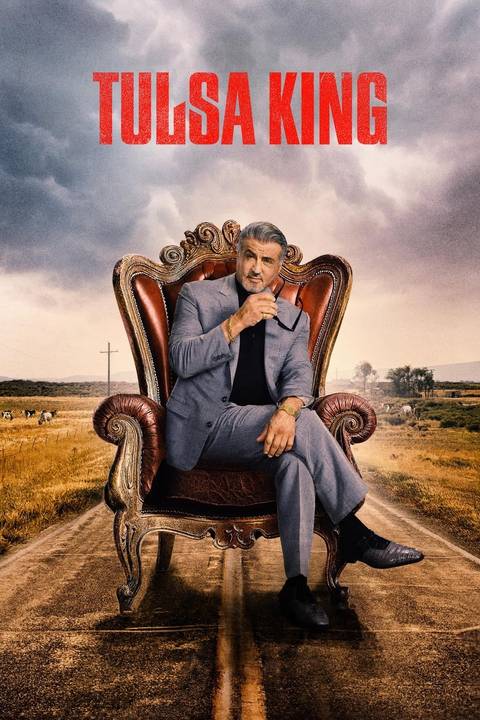
- Release Date
-
November 13, 2022
- Network
-
Paramount+
- Showrunner
-
Dave Erickson, Terence Winter
- Directors
-
Allen Coulter, Benjamin Semanoff, David Semel, Guy Ferland, Joshua Marston, Kevin Dowling, Lodge Kerrigan, Jim McKay
- Writers
-
Joseph Riccobene, David Flebotte, William Schmidt, Taylor Elmore, Tom Sierchio, Regina Corrado, Stephen Scaia, Terence Winter
Entertainment
President Trump Introduces Team USA Hockey At State of the Union Address
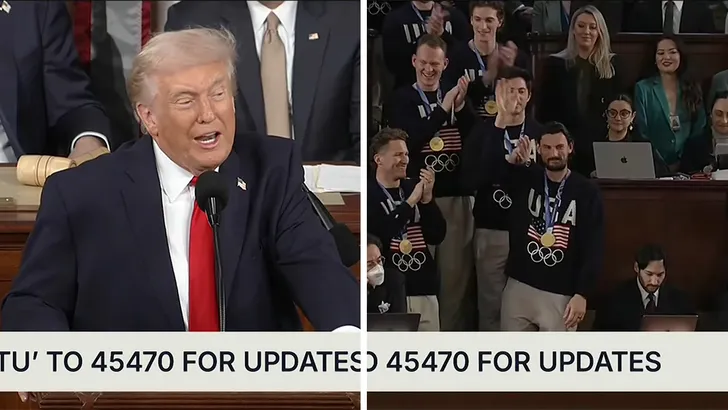
TEAM USA HOCKEY
Trump Honors Gold Medalists at SOTU
… And Awards Medal of Freedom!!!
Published

The White House
President Donald Trump just introduced the U.S. men’s hockey team as his special guests at the State of the Union address on Tuesday — showing the gold medal winners grinning from ear-to-ear.
They were honored for about five minutes full of applause, cheers and U-S-A chants that rang throughout the Capital building. Trump congratulated them — and noted it was the first time he saw Democrats rise from their seats.
“Here with us tonight is a group of winners who just made the entire nation proud,” he said as the team entered the House chamber.
Trump also congratulated the U.S. women’s team for its gold medal … saying they “soon will be coming to the White House.”
He then took a moment to single out goalie Connor Hellebuyck — who he says the team nominated to be awarded the Presidential Medal of Freedom.
“Think of it 46 shots on goal — and I ask him, ‘The one shot where you put your stick in the back and it bounced off, did you practice that? Or was it a little lucky?’” Trump said, playfully noting that Hellebuyck refused to answer the question.
POTUS made the promise just minutes after the Red, White and Blue won the overtime thriller over Canada on Sunday … telling the guys he’d love to have them experience his speech in person, while also joking he had to invite the gold medal-winning women’s team too, or he’d be impeached.
There has been some controversy around Team USA fanboying over Trump … but as Olympic hero Jack Hughes put it, their focus is on patriotism, not politics.
🚨BREAKING: Reporter ask Team USA hockey star Jack Hughes “Are you excited to go to the White House to meet Trump?”
“Yeah we’re excited!”
“Everything is so political. We’re athletes, we’re proud to represent the US. And when you get the chance to go the White House to meet the… pic.twitter.com/VHP3LJzbWY
@KMGGaryde
The backlash didn’t derail the squad from their festivities … which included a trip to E11EVEN in Miami before hopping on an Air Force jet to get to the White House for a tour.
The gang even had some one-on-one time with Trump in the Oval Office … but several players opted out of the trip altogether.
Now that Trump’s SOTU speech is in the books … it’s time for these Olympic superstars to get back to their day jobs in the NHL.
Entertainment
‘The Rookie’ Season 8 Confirmed for Very Important Crossover Episode

As The Rookie continues its eighth season, the show will make an exciting crossover in its upcoming episode. This crime drama had crossover episodes in the past, but this will be the first where it’s not tied to The Rookie universe. Instead, the show will cross over to another IP that not only leans toward a different genre, but also a different format.
The Rookie is a crime drama starring Nathan Fillion as John Nolan, a 40-year-old who relocates to Los Angeles to become an LAPD officer and has to prove himself despite his age. The series is loosely inspired by executive producer William Norcross, who joined the LAPD in his mid-40s. While the show includes moments of humor, it remains grounded as Nolan faces high-risk situations and intense challenges on the job. But what happens when a series known for its serious tone collides with an online show built around comedy?
ABC has released details for The Rookie’s 9th episode, titled “Fun and Games,” revealing that it will be a crossover episode with the online game show, Game Changer, by Dropout. It was reported that the Dropout studio, where Game Changer is filmed, would be the scene of a crime due to a robbery report, and that one of the people in the studio would be a “familiar face” to Nolan. The plot reads:
“Harper and Miles feel the weight of their recent mistakes, while Harper is tasked with training Miles. Nolan and Celina are dispatched to a robbery call where Nolan encounters a familiar face.”
This Game Changer crossover will star Dropout’s CEO and game show host, Sam Reich, along with other Dropout stars: Vic Michaelis, Jacob Wysocki, Zac Oyama, and Anna Garcia. The episode will air on March 2 and will be available to stream on Hulu the next day.
What’s ‘Game Changer’ About?
Game Changer is a comedy web show created by Dropout that first aired in 2019 and is still showing to this day. According to Polygon, the show combines “improv comedy, puzzle solving, fierce competition, and a prankster ethos.” While the show mostly features returning faces from CollegeHumor, like Brenan Lee Mulligan, it also had special episodes where celebrities participated, like Giancarlo Esposito (The Mandalorian), Michael Winslow (Spaceballs), Sarah Natochenny (Pokémon), Tony Hawk, and Howie Mandel (American Idol), to name a few.
Game Changer is one of many web shows available on Dropout. Other shows include Make Some Noise, Dimension 20, Um, Actually, and, recently, Reich announced on social media that Dropout will be the home of the online web series and British TV show Don’t Hug Me I’m Scared.
New episodes of The Rookie air on ABC and are available to stream on Hulu. Follow Collider to stay up to date with the latest updates.

- Release Date
-
October 16, 2018
- Showrunner
-
Alexi Hawley
- Directors
-
Tori Garrett, Chi-Yoon Chung, Michael Goi, Sylvain White, Lisa Demaine, Lanre Olabisi, Bill Johnson, David McWhirter, Liz Friedlander, Daniel Willis, Toa Fraser, Anne Renton, Jon Huertas, Cherie Nowlan, TK Shom, Rob Seidenglanz, Valerie Weiss, Barbara Brown, Charissa Sanjarernsuithikul, SJ Main Muñoz, Nelson McCormick, Marcus Stokes, Adam Davidson, Anna Mastro
- Writers
-
Corey Miller, Bill Rinier, Zoe Cheng, Mary Trahan, Ally Seibert, Liz Alper, Nick Hurwitz, Racheal Seymour, Madeleine Coghlan, David Radcliff
-

 Video5 days ago
Video5 days agoXRP News: XRP Just Entered a New Phase (Almost Nobody Noticed)
-

 Fashion4 days ago
Fashion4 days agoWeekend Open Thread: Boden – Corporette.com
-

 Politics3 days ago
Politics3 days agoBaftas 2026: Awards Nominations, Presenters And Performers
-

 Entertainment7 days ago
Entertainment7 days agoKunal Nayyar’s Secret Acts Of Kindness Sparks Online Discussion
-

 Sports1 day ago
Sports1 day agoWomen’s college basketball rankings: Iowa reenters top 10, Auriemma makes history
-

 Politics1 day ago
Politics1 day agoNick Reiner Enters Plea In Deaths Of Parents Rob And Michele
-

 Tech7 days ago
Tech7 days agoRetro Rover: LT6502 Laptop Packs 8-Bit Power On The Go
-

 Sports6 days ago
Sports6 days agoClearing the boundary, crossing into history: J&K end 67-year wait, enter maiden Ranji Trophy final | Cricket News
-

 Business3 days ago
Business3 days agoMattel’s American Girl brand turns 40, dolls enter a new era
-

 Business2 days ago
Business2 days agoLaw enforcement kills armed man seeking to enter Trump’s Mar-a-Lago resort, officials say
-
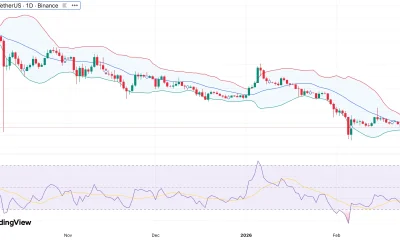
 Crypto World21 hours ago
Crypto World21 hours agoXRP price enters “dead zone” as Binance leverage hits lows
-

 Entertainment6 days ago
Entertainment6 days agoDolores Catania Blasts Rob Rausch For Turning On ‘Housewives’ On ‘Traitors’
-
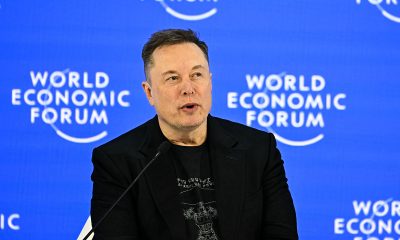
 Business7 days ago
Business7 days agoTesla avoids California suspension after ending ‘autopilot’ marketing
-

 Tech2 days ago
Tech2 days agoAnthropic-Backed Group Enters NY-12 AI PAC Fight
-

 NewsBeat2 days ago
NewsBeat2 days ago‘Hourly’ method from gastroenterologist ‘helps reduce air travel bloating’
-

 NewsBeat2 days ago
NewsBeat2 days agoArmed man killed after entering secure perimeter of Mar-a-Lago, Secret Service says
-

 Politics3 days ago
Politics3 days agoMaine has a long track record of electing moderates. Enter Graham Platner.
-
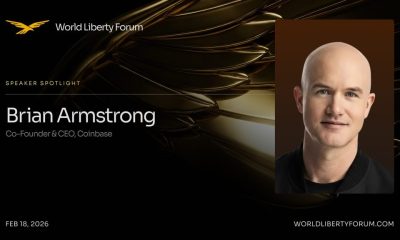
 Crypto World6 days ago
Crypto World6 days agoWLFI Crypto Surges Toward $0.12 as Whale Buys $2.75M Before Trump-Linked Forum
-

 Tech11 hours ago
Tech11 hours agoUnsurprisingly, Apple's board gets what it wants in 2026 shareholder meeting
-

 NewsBeat6 hours ago
NewsBeat6 hours agoPolice latest as search for missing woman enters day nine







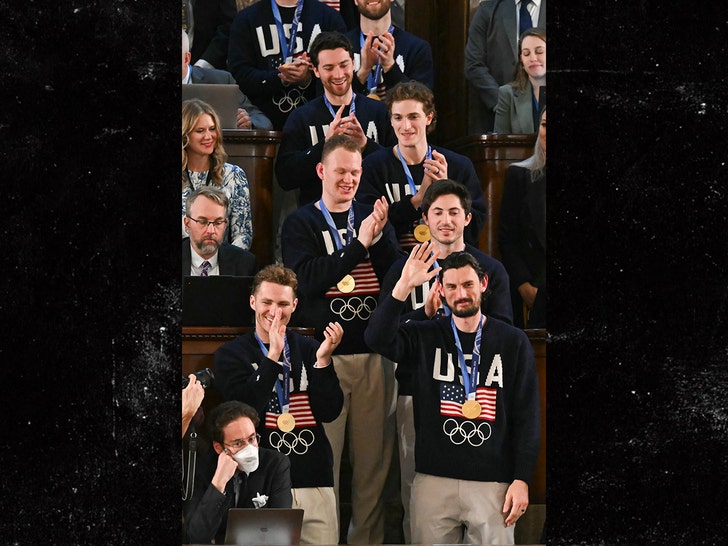





![Lyn Alden: "This Changes Everything For Bitcoin & Crypto" [New 2026 Bitcoin and Crypto Prediction]](https://wordupnews.com/wp-content/uploads/2026/02/1771993640_maxresdefault-80x80.jpg)

